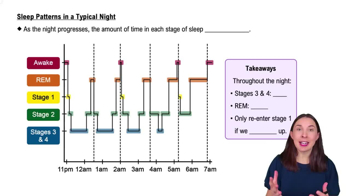Table of contents
- 1. Introduction to Psychology1h 43m
- 2. Psychology Research2h 20m
- 3. Biological Psychology2h 41m
- 4. Sensation and Perception28m
- 5. Consciousness and Sleep32m
- 6. Learning41m
- 7. Memory34m
- 8. Cognition37m
- 9. Emotion and Motivation35m
- 10. Developmental Psychology33m
- 11. Personality48m
- 12. Social Psychology41m
- 13. Stress and Health41m
- 14. Psychological Disorders44m
- 15. Treatment47m
5. Consciousness and Sleep
Sleep
Struggling with Psychology?
Join thousands of students who trust us to help them ace their exams!Watch the first videoMultiple Choice
The social-cognitive theory of hypnosis assumes that people who are hypnotized are
A
only playing a role.
B
in a fully altered state.
C
in a kind of dreamlike state.
D
completely under the command of the hypnotist.
 Verified step by step guidance
Verified step by step guidance1
Understand the social-cognitive theory of hypnosis, which suggests that hypnosis is not an altered state of consciousness but rather a social interaction where the participant plays a role.
Recognize that according to this theory, individuals who are hypnotized are not in a fully altered state or a dreamlike state.
Acknowledge that the theory posits that hypnotized individuals are not completely under the command of the hypnotist, but are instead actively engaging in the role expected of them.
Consider the idea that the behavior of hypnotized individuals is influenced by their expectations and the social context, similar to how actors perform roles in a play.
Conclude that the social-cognitive theory views hypnosis as a collaborative process where the participant is aware and consciously playing a role, rather than being in a passive or unconscious state.

 3:25m
3:25mWatch next
Master Circadian Rhythms with a bite sized video explanation from Hannah Gordils
Start learningRelated Videos
Related Practice


































































































![Race, Genes and IQ Differences | Bret Weinstein [Mini Clip]](https://img.youtube.com/vi/IztL_m3pd70/mqdefault.jpg)



































































































